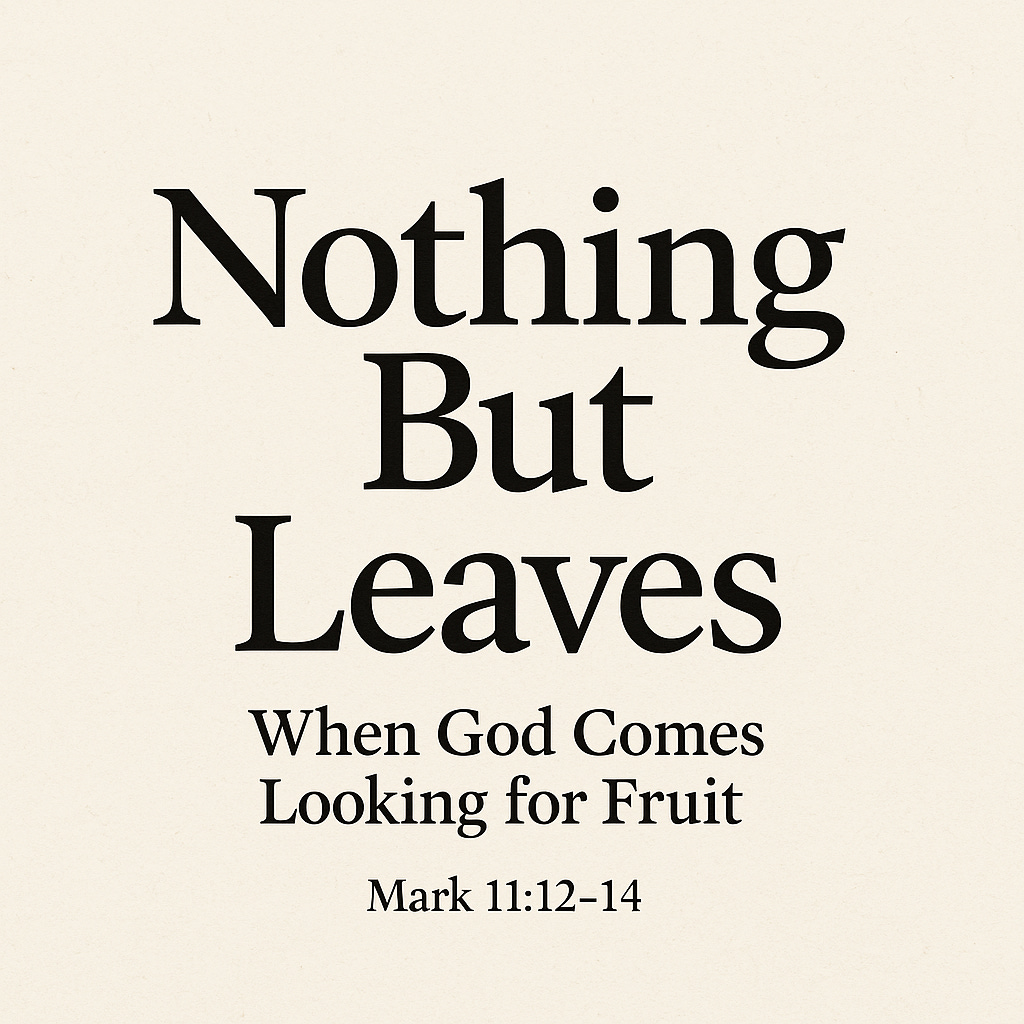The fig tree incident in Mark 11:12–14 takes place just after a significant moment in Jesus’ ministry: the Triumphal Entry into Jerusalem. Crowds had shouted “Hosanna!” and laid palm branches at His feet, welcoming Him as Messiah (Mark 11:1–11). It was a moment charged with public praise—yet also with spiritual pretense. The same voices that exalted Him that day would turn against Him by week’s end.
After the procession, Jesus didn’t linger in Jerusalem. “He went into the temple courts…and since it was already late, He went out to Bethany with the Twelve” (Mark 11:11). He left the noise of the city and retreated to Bethany—a quiet village on the Mount of Olives, just two miles from Jerusalem. Bethany was more than a rest stop. It was a place of peace and intimacy. It was where He was welcomed by Martha (Luke 10:38), loved by Mary (John 12:3), and deeply connected to Lazarus, whom He had raised from the dead (John 11:1–44). In many ways, Bethany was home.
Yet even in this familiar, beloved place, Jesus woke up hungry (Mark 11:12). This hunger wasn’t just physical—it was symbolic. He had just been celebrated by the crowds, retreated to a house where He was honored, and still…He longed for something more. His hunger reveals a divine ache—not just for nourishment, but for spiritual fruit.
When Jesus saw a fig tree in the distance with leaves (Mark 11:13), He approached it expecting to find figs. In that region, fig trees produce early fruit (called “breba”) even before their full season, and leaves typically indicated the presence of such fruit. But this tree, though leafy and full in appearance, was empty beneath the surface. “He found nothing but leaves.”
It is a powerful metaphor for the people of Jerusalem—and for us. Outwardly, the city had welcomed Him. Outwardly, the fig tree promised nourishment. But when He came close, there was nothing to satisfy His longing. No substance. No surrender. No fruit.
“Having a form of godliness but denying its power.” — 2 Timothy 3:5
“These people honor me with their lips, but their hearts are far from me.” — Matthew 15:8
This is the danger of spiritual appearance without spiritual reality. God is not fooled by leaves. He approaches our lives looking for fruit—evidence of transformation, intimacy, obedience, and grace. Jesus’ hunger teaches us something essential: it is possible to be close to Jesus, involved in ministry, surrounded by miracles—and still be spiritually barren.
This is a moment of divine disappointment. The tree advertised abundance but yielded nothing of substance. The lesson is clear: God isn’t fooled by our foliage—He’s searching for our fruitfulness.
Jesus hungered not for show but for surrender. His approach to the fig tree unveils an important truth about divine expectation: hunger reveals hope. Jesus hoped to find fruit, because the tree had leaves. It signaled growth. But its signal was deceptive. It had the signs of life without the substance of it. That is a mirror for many of us today. We know the right words. We show up to church. We perform the motions. But when God comes close—what will He find? Will He taste love, joy, peace, patience, and kindness? Or will He find pride, bitterness, and self-preservation hiding beneath leafy appearances?
The fig tree was blessed. It had leaves, sunlight, and rich soil. But it was still broken. Because anything that doesn’t fulfill its God-given purpose is malfunctioning. According to Isaiah 55:11, everything God creates has an assignment. When our lives produce only leaves and no lasting fruit, we are living below God’s design. Jesus makes it plain in John 15:2—unfruitful branches are removed not because they are unloved, but because they are disconnected. Brokenness, in God’s eyes, is not about flaws or struggles—it is about failing to function in your divine assignment.
What makes this text even more striking is that it wasn’t fig season. Yet Jesus still cursed the tree. That seems unfair—until we understand that in God’s kingdom, fruitfulness IS NOT seasonal. It is faithful. We don’t bear fruit only when it’s easy, convenient, or comfortable. We bear fruit because we remain connected to the Vine. John 15:5 reminds us that apart from Christ, we can do nothing. Real fruit grows not from ideal conditions but from the right connection.
So, why do we remain fruitless? The text points to four causes of brokenness that often block our fruitfulness—Position, Pinching, Pollination, and Propagation.
First, Position. Where are you planted? Psalm 92:13 says those planted in the house of the Lord will flourish. But many of us were planted in brokenness—homes filled with trauma, dysfunction, or lack. That context can’t be ignored. Some of us were rooted in fear, scarcity, and shame. But while your planting may explain your pain, it does not define your future. God can replant you. He can dig up what’s toxic, loosen the soil around your roots, and place you in promise. You don’t have to stay where you started.
Second, Pinching (when done with the hands) or Pruning (when done with a pruner). God often slows our outward growth to ground our internal strength. John 15:2 reminds us that fruitful branches are pruned—not punished or cut off. Like fig farmers, God pinches us to redirect energy toward fruit, not just foliage. That pruning may look like delays, closed doors, or painful endings—but it is preparation. Paul called it a thorn in his flesh, a reminder of dependence on grace (2 Cor. 12:7–9). God pinches not to harm us, but to awaken what’s buried within.
Third, Pollination. Fruitfulness is relational. Fig trees cannot pollinate themselves. They require the transfer of life from another source. That’s why Hebrews 10:24–25 tells us to remain in fellowship, spurring one another toward love and good works. Some of us are fruitless not because we lack faith, but because we lack community. We were never meant to grow alone. Isolation suffocates purpose. We need relationships that pollinate our potential—people who speak life into us, challenge us, and call us higher.
Fourth, Propagation. Unlike most trees, figs reproduce fruits not through seeds, but through a process of cutting and burying parts of the original tree so new life can emerge. This is the image of salvation. Jesus was cut down, laid down, and buried—so we could grow in Him. John 12:24 says unless a grain of wheat dies, it remains alone. But if it dies, it produces much fruit. We are not ordinary—we are born of divine DNA, rooted in the Vine of Christ. If we remain in Him, we will bear much fruit—not by effort alone, but by spiritual inheritance.
Yet even if you’ve been fruitless until now, there is still hope. Luke 13:6–9 tells the parable of the fig tree that bore no fruit. The owner wanted to cut it down. But the gardener—Jesus—asked for one more year. “Let me dig around it and fertilize it,” He said. That’s grace. That’s the mercy of our God who doesn’t give up on barren trees. He digs, He disturbs, and He fertilizes—not with comfort, but with substance. His Word, His Spirit, even the trials of life—become the fertilizer that prepares us for a future harvest.
Digging removes distractions. Fertilizing may stink—but it nourishes what’s hidden in your soul. God is not afraid of your mess. In fact, He uses it. The worst season of your life might be the soil where your best fruit will grow.
So here’s the call: Let God reposition you. Let Him dig and fertilize the parts of your life that have grown hard or hollow. Let Him prune what no longer serves you. And most of all—stay connected. Because fruitfulness is not optional in the kingdom. It is the evidence that we are alive in Christ.
Prayer Declaration:
I am fruitful.
I am planted.
I am connected.
I am filled with power.
I will bear fruit in every season.
Amen!















Share this post